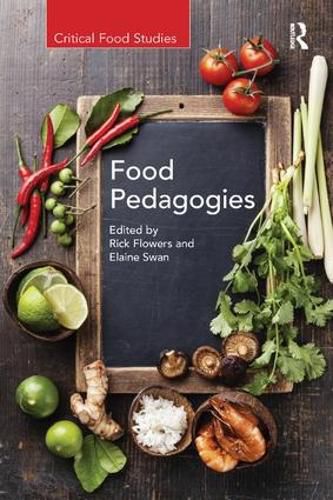Readings Newsletter
Become a Readings Member to make your shopping experience even easier.
Sign in or sign up for free!
You’re not far away from qualifying for FREE standard shipping within Australia
You’ve qualified for FREE standard shipping within Australia
The cart is loading…






In recent years everyone from politicians to celebrity chefs has been proselytizing about how we should grow, buy, prepare, present, cook, taste, eat and dispose of food. In light of this, contributors to this book argue that food has become the target of intensified pedagogical activity across a range of domains, including schools, supermarkets, families, advertising and TV media. Illustrated with a range of empirical studies, this edited and interdisciplinary volume - the first book on food pedagogies - develops innovative and theoretical perspectives to problematize the practices of teaching and learning about food. While many different pedagogues - policy makers, churches, activists, health educators, schools, tourist agencies, chefs - think we do not know enough about food and what to do with it, the aims, effects and politics of these pedagogies has been much less studied.
Drawing on a range of international studies, diverse contexts, genres and different methods, this book provides new sites of investigation and lines of inquiry. As a result of its broad ranging critical evaluation of ‘food as classroom’ and ‘food as teacher’, it provides theoretical resources for opening up the concept of pedagogy, and assessing the moralities and politics of teaching and learning about food in the classroom and beyond.
$9.00 standard shipping within Australia
FREE standard shipping within Australia for orders over $100.00
Express & International shipping calculated at checkout
In recent years everyone from politicians to celebrity chefs has been proselytizing about how we should grow, buy, prepare, present, cook, taste, eat and dispose of food. In light of this, contributors to this book argue that food has become the target of intensified pedagogical activity across a range of domains, including schools, supermarkets, families, advertising and TV media. Illustrated with a range of empirical studies, this edited and interdisciplinary volume - the first book on food pedagogies - develops innovative and theoretical perspectives to problematize the practices of teaching and learning about food. While many different pedagogues - policy makers, churches, activists, health educators, schools, tourist agencies, chefs - think we do not know enough about food and what to do with it, the aims, effects and politics of these pedagogies has been much less studied.
Drawing on a range of international studies, diverse contexts, genres and different methods, this book provides new sites of investigation and lines of inquiry. As a result of its broad ranging critical evaluation of ‘food as classroom’ and ‘food as teacher’, it provides theoretical resources for opening up the concept of pedagogy, and assessing the moralities and politics of teaching and learning about food in the classroom and beyond.